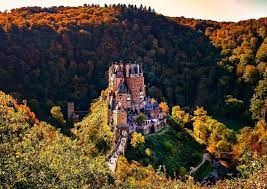20 Germany Facts That Might Surprise You
Numerous intriguing facts about Germany, a nation renowned for its extensive history, great culture, and robust economy, go mostly undetected. Let’s explore some lesser-known facets of this amazing country.
a country with castles
Around 25,000 castles may be found in Germany, which has a rich architectural and historical legacy. These buildings serve as active historical archives for the country.
There are almost 25,000 castles in Germany, and each one has a distinct history and architectural legacy.
Countless Forests
A third of Germany’s territory is covered in beautiful woods, which encircle the country. These woodlands are well-kept and used for both recreational and environmental reasons.
Germany’s forests cover over one-third of its total land area, demonstrating the country’s dedication to environmental protection and offering a variety of recreational opportunities.
The Automobile’s Invention
The first gasoline-powered vehicle is ascribed to Karl Benz, who is credited with developing it in Germany between 1885 and 1886. The contemporary world was molded by this innovation, which completely changed how people traveled.
German inventor Karl Benz is credited with inventing the first gasoline-powered vehicle, which launched the modern age of the automobile and revolutionized worldwide transportation.
Oktoberfest celebrations
Germany is where the legendary beer festival Oktoberfest first took place. It’s a yearly celebration in Munich that draws millions of tourists from all over the world to enjoy authentic German beer and lively celebrations.
The worldwide phenomenon known as Oktoberfest began in Germany, specifically in Munich. Millions of tourists from all over the globe are enthralled by this classic beer festival, which offers a genuine experience of German cuisine and drinks.
Numerous Bread Varieties
With over 300 different varieties of bread produced, each with its own distinct flavor and texture, Germany is recognized for its rich bread culture. In German cuisine, bread has a specific position and is a common component.
With over 300 different varieties of bread, the German bread culture is a joy, reflecting the country’s firmly ingrained culinary traditions and tastes.
Tales from The Grimm Brothers
German scholars and writers Jacob and Wilhelm Grimm are well renowned for their collection of fairytales, which includes timeless stories like Cinderella, Snow White, and Hansel and Gretel.
Jacob and Wilhelm Grimm are renowned authors from Germany, and their collection of fairytales has enthralled readers all around the globe for years.
Fall of the Berlin Wall
A significant turning point in history occurred in 1989 when the Berlin Wall fell, signifying the end of the Cold War and the reunification of Germany. Both the country and the globe underwent a huge shift as a result of this catastrophe.
The collapse of the Berlin Wall in 1989, which symbolized the end of the Cold War and the reunification of a divided Germany and set off a wave of change around the world, is remembered as a momentous historical event.
A Country of Innovators
The printing press, aspirin, MP3 technology, and X-rays are just a few of the amazing innovations and innovators from Germany. Modern Germany is still thriving thanks to its innovative past.
Germany has a long history of revolutionary discoveries, including the printing press, aspirin, MP3 technology, and X-rays, demonstrating the country’s persistent spirit of creativity.
where the first Christmas tree was born
Christmas tree custom is said to have originated in Germany. The nation’s Christmas festivities have included adorned Christmas trees since the 16th century, making them an essential component.
The Christmas tree custom is said to have originated in Germany in the 16th century, and it has since spread around the world and become an essential feature of the holiday season.
The Addiction to Sauerkraut
A favorite German meal is sauerkraut, which is fermented cabbage. In addition to being a gourmet treat, this acidic and tasty food item has several health advantages.
The popular German food sauerkraut, which is produced from fermented cabbage, is not only delicious but also has a host of health advantages, demonstrating the Germans’ appreciation of both flavor and wellbeing.
The Goethe Influence
German literary genius Johann Wolfgang von Goethe made enormous contributions to global literature. His writings, like as “Faust” and “The Sorrows of Young Werther,” continue to have an impact on intellectuals and writers across the globe.
Johann Wolfgang von Goethe, a literary giant from Germany, is remembered for his immortal masterpieces like “Faust” and “The Sorrows of Young Werther,” which helped to shape the literary landscape for future generations.
The Custom of the Christmas Market
Germany is renowned for its charming Christmas markets, where tourists can enjoy the festive ambiance, indulge in seasonal sweets, and browse for handmade presents. An essential component of the Christmas season is these marketplaces.
The world-famous Christmas markets in Germany are an integral part of the nation’s treasured holiday customs because they provide a magnificent atmosphere, mouthwatering seasonal snacks, and handmade presents.
The Young Voter’s Age
Germany recognizes the right of 16-year-olds to participate in the political process by allowing them to vote. The young are encouraged to actively participate and be informed thanks to this forward-thinking strategy.
The voting age in Germany is 16, enabling young people to take part in the political process and have their opinions heard, encouraging civic involvement and responsibility from an early age.
The country of clean energy
With a focus on a sustainable future, Germany is a worldwide pioneer in adopting renewable energy sources. The country makes significant investments in biomass, solar, and wind energy, demonstrating its dedication to environmental preservation.
With significant investments in wind, solar, and biomass energy, Germany is at the forefront of the trend toward renewable energy, demonstrating its commitment to a sustainable future and environmental preservation.
An International Nation
There are more than 80 million people in Germany who speak German as their primary language, making it a linguistically varied country. However, a sizable chunk of the populace also speaks English and other languages well.
Over 80 million people in the linguistically varied country of Germany speak German as their first language, but a sizeable fraction of the population is also fluent in English and other languages, expressing a view of the world.
The Purity Beer Tradition
Germany takes pride in the Reinheitsgebot, a beer purity rule that dates back to 1516. This regulation guarantees that water, malt, hops, and yeast are the only organic materials used in the production of German beer.
Germany takes great pleasure in the Reinheitsgebot, a regulation enacted in 1516 that emphasizes the use of only natural components in the brewing of beer, including water, grain, hops, and yeast.
The Significant Beethoven
German composer and musician Ludwig van Beethoven was born there. Despite being profoundly deaf, his musical efforts have had a significant impact on classical music, making him a legendary figure.
Despite being deaf, the famous composer and pianist Ludwig van Beethoven, who was born in Germany, had a lasting impression on classical music and is revered across the world.
The History of the Spargelzeit
A beloved German custom is the asparagus season, or Spargelzeit. Germans enthusiastically anticipate this season, marking the asparagus harvest with a variety of recipes and celebrations.
In Germany, the asparagus season, or Spargelzeit, is a much-awaited custom highlighted by jubilant festivals and a profusion of recipes inspired by the treasured asparagus crop.
The Approaching Kindergarten
In the 19th century, Germany pioneered the idea of kindergarten, a pre-school instructional setting. Since then, this ground-breaking strategy for early childhood education has been embraced on a global scale.
The idea of a kindergarten, a pre-school instructional setting, was invented in Germany in the 19th century, and it served as the model for early childhood education techniques that are now used all over the world.
Bauhaus: The Influential Movement
In the early 20th century, Germany was the birthplace of the Bauhaus movement, a significant art and design movement. Its avant-garde style continues to influence contemporary architecture and design all around the world.
The prominent Bauhaus movement, which had its roots in Germany at the turn of the 20th century, had a lasting influence on contemporary architecture and design all around the globe.
In conclusion, Germany’s appeal extends beyond its well-known sites and illustrious past. Germany has had a long-standing and significant influence on the globe, from its innovative inventions to its contributions to the arts and culture.







